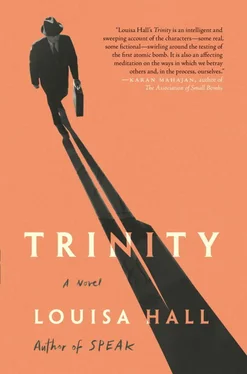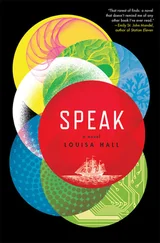But then I thought maybe that was just Barb. She was always oversensitive, and Jacqueline was so sweet she could have charmed Stalin, so I wasn’t concerned in the least when Opje and I went to the kitchen, and while I rummaged around for some olive juice and vermouth, we caught up on the old days in California.
We talked about the monograph I was writing back then, my collection of Native American myths. Then Opje asked me about the new project, and I told him this one was an ethnography in photographs, a study of Europe after the war. And we both knew without saying that it was a new direction for me. My specialty was Native American myth, and I found the new subject depressing. But of course I’d been denied a visa to return to the States, and then Opje acted so interested in the new subject, and so impressed by the new direction I’d taken, that by the time we’d found the olives, it didn’t matter one bit.
There was Opje, leaning on the counter, asking me all sorts of excellent questions, and I’ll tell you what, it made me so happy just to be standing there in the kitchen with Opje, talking about our work like we used to.
Then I asked him if he’d had time, since the war, to go back to studying permanent free fall. He couldn’t believe it! But how could I have forgotten permanent free fall? All those conversations, late into the night, sitting on his back porch and looking up at the stars while Opje explained that somewhere out there in the darkness there were spots of matter so massive and dense they simply vanished.
They collapsed into themselves and disappeared, and so did every little thing that passed by them.
Even sound. Even light! Or that’s what he told me, sitting on that back porch in Berkeley. Every little thing that passed too near those spots bent in and around them and started to spiral until they’d disappeared, vanished as though they’d never existed.
Later they called those spots a name. They called them black holes, I think, but it was Opje who predicted them, all the way back at that house on Shasta Road. Standing there in the kitchen while Opje poured the gin into the glasses, we laughed about those nights for a while, and then Opje told me he hadn’t had much time to get back to physics.
He looked a little sad about that, so I changed the subject. I asked him about California. I’d heard he’d moved back there after the war. Of course by the time he came to Paris, they’d moved to Princeton. But for a year or two, after the war, when he’d left the Manhattan Project, he was in California again. So I asked him if he’d seen any of the old gang that used to gather on Shasta Road.
He couldn’t believe it! But how could I have forgotten the name of that street? I remembered everything about that little house, like how he kept the windows open all year, so the smell of eucalyptus swept through the kitchen.
In the winter, he built great big crackling fires. Then we sat around in the redwood-paneled living room, with Navajo blankets draped over our knees, and even though we were only a few miles away from San Francisco, we felt like frontiersmen.
We were so far away. The war in Europe was happening on a different planet completely, in a different universe. We gathered around Opje’s fire and drank his red wine, and even those black holes seemed to be closer than Europe. Still, sometimes, after reading the news, we came up with schemes to send ambulances to the rebels in Spain. We raised money for refugees from Germany. On the home front, we got involved in the dockworkers’ strike and organizing a teachers’ union at Berkeley.
We had so much energy in those days! We didn’t just talk. We put that union together. Everyone chipped in, people of all possible backgrounds, and there was no internal strife whatsoever.
That’s what Opje and I had to remember, standing there in the kitchen of that little apartment. It put a smile back on my face, I’ll tell you what. There I was, smiling like a fool, still on the hunt for the vermouth, and meanwhile I asked Opje all about the old gang: Haakon Chevalier, and that Sanskrit professor, and Bernard Peters, and his wife, Hannah.
I even asked Opje about his graduate students. Those admiring kids! They smoked Chesterfield cigarettes because that’s what Opje smoked. They flicked the ash off with their pinkie fingers, because that’s how Opje did it. When they talked they sort of quietly mumbled, nim nim nim nim, because that’s how Opje delivered his lectures, and they also came up to that house on Shasta Road. They sat with us by the fire, and when we were hungry Opje cooked eggs à la Opje.
Did we ever laugh about that, all those years later in Paris! I said I remembered how he scrambled those eggs with peppers he pulled from a strand, and Opje told me he learned to make them during one of the summers he spent as a kid, camping in New Mexico: pitching his tent alone, listening all night to the screams of the mountain lions that slept in the trees.
It was a woman, he said, in a nearby hacienda, who taught him to make eggs à la Opje. And for a second, when he told me that, he looked just like he did back in Berkeley: that wistful expression, those sensitive eyes.
Then I reminded him how those boys ate their eggs: Like they hadn’t eaten in months. Like it was their last meal on the planet! Standing in that kitchen in our Paris apartment, where I finally found an old bottle of vermouth, we had a good laugh about that. Then I asked Opje if he saw any of those kids when he moved back to California, and he told me he hadn’t.
Then he changed the subject, and later I asked if he remembered when he tried to get Bernard Peters a job in the Physics Department, but the chair told him one Jew in the department was plenty.
Then I found him a jar to use as a shaker, and while he mixed the martinis, I asked if those boys had teaching jobs now, or if, like me, they’d had trouble finding work because of our politics during those years. And then I began to feel a touch maudlin.
I sometimes did, when I remembered those difficult days after the war, when things had gone south with Barb and I was sending letter after letter to the State Department, asking for the grounds on which my employment kept getting revoked.
But then Opje finished mixing the drinks, and we carried them out, and just looking at Jacqueline cheered me right up. She’d gotten up from her chair to change the record I’d chosen, and she was looking so sweet, wearing men’s trousers and chewing on a wisp of her hair.
What a beautiful girl, I thought, and then she turned and looked at me with a somewhat odd expression, almost confused, as though for a moment she didn’t know me. And in that moment she looked so vulnerable and alone—like the girl she must have been before the Occupation, when her parents sent her away from Paris to live with her grandmother in Metz—that I wanted to go over and kiss her.
But then she came back to the table, and the four of us drank our martinis, and I did notice that Jacqueline was a little quieter than she usually was, but then she rose and went into the kitchen, and when she came back, carrying the cheese plate before her, I suddenly remembered Barb’s face.
I remembered it as clearly as if she were standing right there. And I’ll tell you what: it almost brought tears to my eyes!
I really felt, for a moment, as if we were all back in Berkeley, the four of us, having a dinner party together. So then I went into the bedroom and got out the big turquoise ring and the agate-inlaid hunting knife that I got from a Hopi man when Barb and I were in Utah, and then we finished the cheese.
Then Opje made a second round of martinis, and it was all so much like the old days that suddenly I remembered that afternoon back in Berkeley, when we all drove down to the picket line on the docks, and how afterward we went back to Barb’s house, that sprawling mansion perched on a cliff.
Читать дальше












